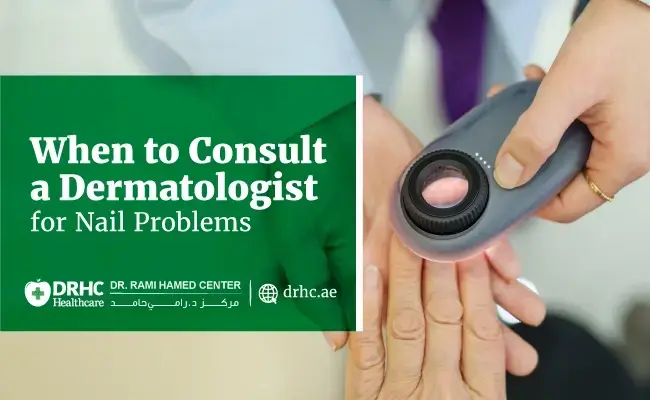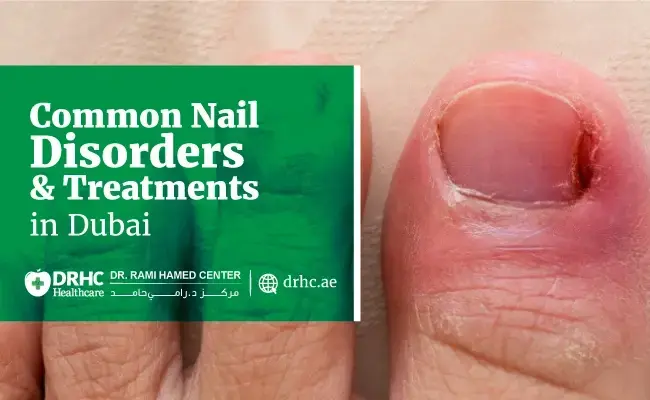
Sudden itchy red bumps appearing on your skin can be both uncomfortable and worrying. Known medically as urticaria, hives are a common skin condition that affects people of all ages. In Dubai’s hot and humid climate, flare-ups can be more frequent, often triggered by heat, certain foods, or stress.
At Dr. Rami Hamed Center (DRHC) in Dubai, we understand how distressing it can be when these itchy patches appear unexpectedly—especially when they keep coming back. This guide explains what causes hives, how to manage them effectively, and what treatment options are available to help you find lasting relief.
What Are Hives?
Hives are raised, red or skin-colored welts that can appear anywhere on the body. They often itch, burn, or sting and may change shape or move around within hours.
Hives occur when the body releases histamine, a chemical that triggers inflammation in response to certain triggers—whether it’s an allergic reaction or another underlying cause.
There are two main types:
- Acute hives: Last less than six weeks, often caused by allergies, infections, or environmental triggers.
- Chronic hives: Persist for more than six weeks and may not have an identifiable cause.
Common Hives Triggers in Dubai
Understanding your triggers is the first step toward preventing flare-ups. Here are some of the most common causes our dermatologists see among patients in the UAE:
- Heat and Sweating
Dubai’s climate can worsen heat-induced hives, especially after exercise or sun exposure. - Food Allergies
Common culprits include shellfish, nuts, eggs, and certain fruits. Even food additives or preservatives can trigger reactions in sensitive individuals. - Medications
Some antibiotics, pain relievers (like ibuprofen or aspirin), or blood pressure medicines may cause allergic hives. - Insect Bites and Stings
Mosquitoes, bees, and other insect bites can cause local or widespread hives in allergic individuals. - Stress and Anxiety
Emotional stress doesn’t cause hives directly, but can trigger or worsen flare-ups. - Contact with Irritants
Perfumes, detergents, or certain fabrics may cause skin irritation, leading to hives. - Infections and Illnesses
Viral or bacterial infections sometimes trigger immune reactions that appear as hives.
Treatment Options for Hives at DRHC Dubai
The right treatment depends on what’s causing your hives and how severe your symptoms are. At DRHC Dubai, dermatology specialists tailor each plan to the individual’s triggers, lifestyle, and skin condition.
1. Identifying the Trigger
A detailed medical history and, if needed, allergy testing can help determine the cause of your hives. Identifying triggers allows for better prevention and long-term management.
2. Antihistamines
These are the most common first-line treatments. They block histamine—the chemical responsible for itching and swelling—and help control flare-ups.
3. Short-Term Corticosteroids
In severe cases, short courses of oral corticosteroids may be prescribed to quickly reduce inflammation and discomfort.
4. Advanced Medical Therapies
For chronic hives that don’t respond to standard medication, newer biologic treatments can help control symptoms by targeting specific immune responses.
5. Lifestyle and Skincare Guidance
Our specialists often recommend gentle, fragrance-free skincare products, cool compresses, and stress management techniques. Avoiding known triggers—like heat, spicy food, or alcohol—can also help reduce recurrence.
When to See a Doctor
While mild hives often resolve within hours or days, you should seek medical attention immediately if:
- Swelling occurs around your lips, tongue, or throat.
- You experience difficulty breathing.
- Hives are persistent or recurring despite over-the-counter medication.
At DRHC Dubai, our dermatology team provides safe, evidence-based treatments to relieve symptoms and prevent future flare-ups.
FAQs About Hives Treatment in Dubai
1. How long do hives last?
Acute hives usually fade within 24–48 hours, while chronic hives can last for weeks or months.
2. Are hives contagious?
No. Hives are not contagious and cannot spread from one person to another.
3. Can weather in Dubai trigger hives?
Yes. Heat, humidity, and sweating are common triggers that can cause or worsen hives in sensitive individuals.
4. Can stress really cause hives?
Stress doesn’t cause hives directly but can make your immune system more reactive, leading to flare-ups.
5. What is the best way to prevent hives?
Identifying and avoiding your personal triggers—whether food, heat, or stress—is key. Regular follow-ups with your dermatologist help in long-term control.
Conclusion
Living with hives can be frustrating, but with the right approach, it’s entirely manageable. Whether your flare-ups are mild or persistent, professional evaluation helps uncover the cause and create a treatment plan that works best for you.
At Dr. Rami Hamed Center (DRHC) in Dubai, our dermatology experts offer comprehensive evaluation, allergy testing, and advanced treatment options designed to soothe irritation, prevent recurrence, and restore your comfort and confidence.
If you’re experiencing frequent or unexplained hives, book a consultation today and take the first step toward calm, clear skin.
📞 Call / WhatsApp: +97142798200
📍 Visit Us: Dr Rami Hamed Center, Dubai Healthcare City
🌐 Website: www.drhc.ae
Topic: Dermatology







.webp)

Leave a comment